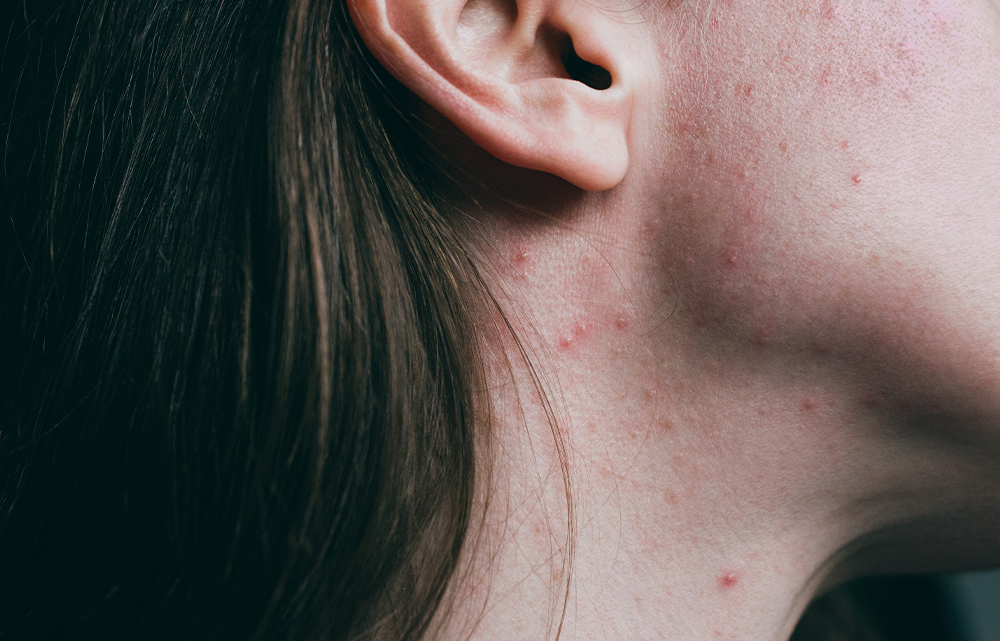What I Wish I Knew About Isotretinoin Before Taking Accutane: A Before and After Experience

For anyone who has struggled with acne or problematic skin, Accutane is undoubtedly a pretty haunting term. Isotretinoin—more commonly known as Accutane—is an intense oral medication for treating severe acne that clears the skin over the course of several months by shrinking the oil glands and reducing sebum production by shrinking the sebaceous glands. For many, like myself, it’s a last resort for solving years of acne and skin issues. I’ve struggled with acne since I was 14, and have tried almost every dermatologist-prescriped topical and oral acne solution on the market: spironolactone, doxycycline, Aczone, Epiduo. You name it, I tried it. But recently, after what felt like a lifetime of trial and error to no avail, I decided to take the plunge and try Accutane for my skin.
Known for its wide array of intense side effects, I was nervous to start Isotretinoin, but after lots of discussion with my dermatologist, six months later I’m on the other side and my skin is the best it’s ever been. That being said, throughout the course of my six-month treatment on Accutane (three months on 30mg of isotretinoin and the other three on 60mg), I had several, not skin-related side effects and experiences that no one—the internet included—warned me about and the, and the effects on my day to day life were pretty significant. For anyone considering starting the Accutane treatment for acne, here is what I wish someone told me before I started.
I was aware from the beginning of my Accutane treatment that I wouldn’t start to see real, noticeable changes in my skin until about halfway through, but no one told me about the dreaded “purging” breakout. After just over six weeks into my Accutane treatment, my acne started breaking out worse than before, with painful, cystic pimples all over my skin. I started to panic thinking that the medication wasn’t working, but it turns out that experiencing a flare up at the beginning of treatment is super common. Essentially, Isotretinoin does a lot to your skin and body, and it takes a bit for your system to adjust, so don’t freak out if your acne gets worse on Accutane before it gets better–the “after” results you’ve seen online will come.
Don’t get me wrong, the dry skin, lips and nose you experience after starting Accutane are REAL, but the more significant issues I faced effected my whole body, not just my skin. Now, my doctor was never certain whether or not the severe heartburn I started experiencing about a month in was in fact one of the side effects of the Accutane (though many Reddit users seem to have faced similar issues throughout the treatment per my internet deep-diving), but after I started Accutane, I have to take over-the-counter heartburn pills weekly to counteract the side effects and prevent myself from having painful bouts of acid reflux every time I eat. Before I started taking Accutane to help, the pain even got so bad I ended up going to the emergency room for chest pain. Though it’s not one of the common side effects, Isotretinoin can cause several strange health issues throughout its acne treatment, and for me, one of the effects was intense heartburn.
Another one of the much more common but equally as painful side effects I began to experience toward the end of treatment was joint pain. My doctor had warned me that joint pain could occur after going on Accutane, and luckily mine never got severe enough to hinder my Isotretinoin treatment, but I did definitely notice that my joints—specifically my knees and hips—where more sensitive than normal. Thankfully it wasn’t excruciating, but it wasn’t fun. Picture that early-morning, just-go-out-of-bed achiness, except all the time. Any time you’re experiencing any sort of side effect while on Accutane–common or not–it’s important to talk to your dermatologist to make sure the medication is still healthy for your body.
I love to try new products and experiment with the latest innovations, especially when it comes to skin and acne products. But, I had to learn throughout my six months that your skin gets so sensitive while on the acne medication that it’s often best to do very little extra. I had to cut down my extravagant, seven-step routine to just a gentle cleanser, moisturizer and sunscreen to keep my skin from becoming inflamed or overly stripped. I noticed over time that a lot of the products I had used on the regular were starting to irritate my skin or burn upon application as a result of my skin’s now hyper-sensitivity, so I learned that it’s best for your skin if you stick to a few gentle products while on Isotretinoin for acne. My dermatologist event recommended a soft but extra-hydrating night cream to combat dryness, and I used it twice a day for quite a while.
I was definitely made aware of the possibility of my anxiety and depression worsening after starting Accutane for my acne, but I personally underestimated how noticeable the effects would be on my mental health. I’ve been on 20mg of Fluoxetine for anxiety and depression since 2019, and almost halfway into my Isotretinoin treatment I had to increase the dose on my antidepressant for the first time in almost five years. Luckily, the impact on my mental health was not as severe as it could have been—patients are warned monthly by their dermatologist to look out for symptoms of psychosis as well as suicidal ideation following the beginning of treatment—but I definitely noticed a significant increase in my overall anxiety level and had to take precautions on my own to prevent it from getting worse throughout my Accutane journey.
Once my skin started to clear up, I was immediately eager to get started on procedures for scar correction as my acne was gone, but I still struggled with acne scars on my face. My dermatologist had recommended I try laser therapy or microneedling after I was done with Accutane, but I found out later that you can’t receive any sort of skin therapy or treatment for at least six months after being on Isotretinoin. Patience is key when it comes to Accutane, but the before and afters on social media don’t lie–if you’re willing to wait out the almost year it takes to fully heal your skin on Accutane (if you’re looking to treat scarring, too) it will be worth it.
At the end of the day, if you’re looking to solve your acne struggles once and for all and give you the skin of your dreams, Accutane will do it. It takes longer than you might think (or hope), but the before-and-after results on the skin are no joke. I personally don’t regret going on Isotretionin for my acne at all as my skin has been an insecurity of mine for so much of my life, and I feel so much more confident now. But, I do wish I was more prepared for just how much Accutane would impact other aspects of my life–not just my skin–while healing my acne struggles.
At NewBeauty, we get the most trusted information from the beauty authority delivered right to your inbox
Find a NewBeauty 'Top Beauty Doctor' Near you




